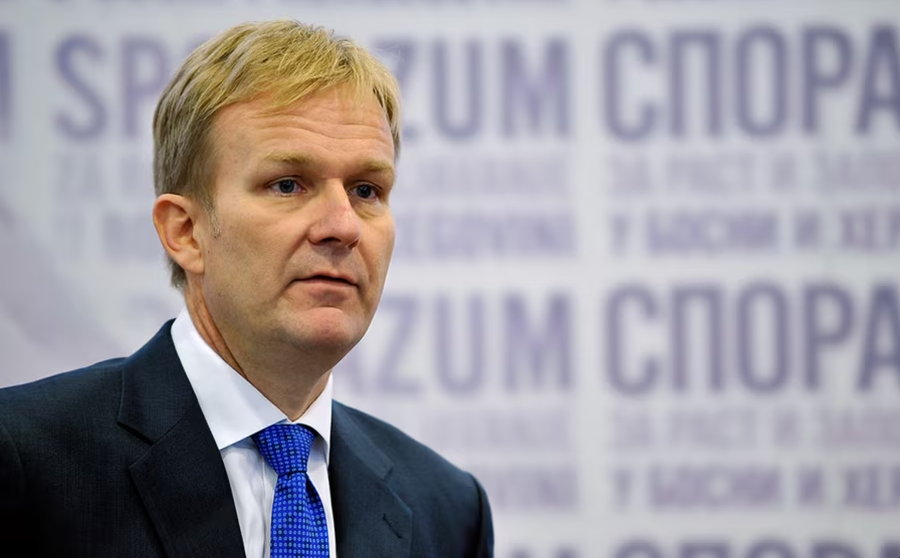
The European Union's envoy for the Pristina-Belgrade dialogue, Peter Sorensen, has said that his priority will be to secure meetings between representatives of Kosovo and Serbia. According to him, it is the parties themselves who will then decide on potential compromises.
"The dialogue is to ensure that there are meetings. Whether this means compromises or not is up to the parties to determine," said Sorensen, during a statement to the media, after meeting with Kosovo Prime Minister Albin Kurti.
The last meeting in Brussels, mediated by the European Union, between Kosovo and Serbia, was held on December 17 of last year.
Sorensen is visiting Kosovo for the first time since taking office in early February, to meet with senior officials from the country.
He called the meeting with Kurti "a good start."
"It was an introductory meeting, we talked about how the process can move forward. It's a good start," Sorensen said.
"Once I have had these conversations [with representatives of Kosovo and Serbia], I can sit down and assess where we are. But it is very clear that the dialogue process also carries a large number of important developments and we need to deal with those as well," Sorensen added.
Earlier, Sorensen also met with Kosovo President Vjosa Osmani. After the meeting, Osmani said that she has asked the European Union (EU) to treat Kosovo "equally" in the Brussels dialogue.
In a Facebook post, Osmani said after the meeting that Kosovo "has already proven itself as a constructive party in the dialogue, committed to peace, democracy and the rule of law."
"Therefore, maintaining the EU's unjust measures against our country is harming not only our citizens but also the necessary balance in the dialogue," said Osmani.
The European bloc imposed punitive measures against Kosovo in 2023, following rising tensions in the north of the country. The EU had assessed that the Kosovo government had not done enough to de-escalate the situation.
Sorensen has not yet mediated any dialogue meetings between Kosovo and Serbia in Brussels, but has recently been working on ways to advance the dialogue, meeting separately with officials from both countries.
He took office on February 1, succeeding Miroslav Lajcak.
At the last meeting in Brussels under the mediation of Lajcak, on December 17, Kosovo and Serbia agreed on the full implementation of the joint statement on missing persons.
The European Union's (EU) foreign policy chief, Kaja Kallas, said last month that she was hearing criticism about the current format of the dialogue between Kosovo and Serbia.
She announced that, together with Sorensen, she was examining the possibility of making the dialogue between the two neighboring countries functional.
Kosovo and Serbia have been dialogued under the mediation of the European Union since 2011. In recent years, the dialogue has been conducted at a high level, between the leaders of the two countries, and at the level of chief negotiators.
During the nearly five-year mandate of the bloc's previous envoy, Miroslav Lajcak, in early 2023 Kosovo and Serbia reached an Agreement on the Path to Normalization of Relations.
The agreement, which has not been signed, is legally binding on the parties, said the bloc, which has accused Kosovo and Serbia of failing to begin implementing the pact.
In the past, Kosovo leaders, from the country's president, Vjosa Osmani, to Prime Minister Albin Kurti, have criticized Lajcak for an unbalanced approach to dialogue and for occasionally siding with Serbia.
It is not clear when Sorensen might hold the first meeting within the framework of the dialogue, given that Kosovo held elections on February 9 and is expected to form a new government, while Serbia faces political uncertainty amid large student protests.
Kallas said in February that he was waiting until Kosovo forms a new government to "see how to proceed."
Sorensen, unlike his predecessor, will only deal with the dialogue between the two neighboring countries, and not with regional Balkan issues.
Sorensen's appointment has been seen as a positive one, given that the 57-year-old knows the region well. A diplomat for many years, he was engaged in Kosovo, within the framework of the United Nations Mission in Kosovo (UNMIK), as well as in other roles, in Serbia, North Macedonia and Bosnia and Herzegovina.
According to political experts, he does not need to be informed in advance about the people or historical facts of the region, because he has already had the opportunity to create an up-close overview.
Another argument that has been mentioned as positive by officials in Pristina is that he is from Denmark, a country that recognizes Kosovo's statehood, and that he will have equal access to dialogue./ REL (A2 Televizion)











